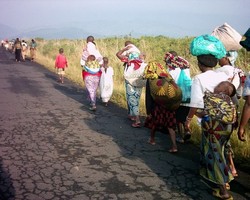KINSHASA, 9 November 2007 (IRIN) - The threat of violence from rebel remnants is preventing thousands of internally displaced persons (IDPs) in northeastern DRC returning home, while harassment by regular troops is adding to their woes, according to the UN. 
Photo: Gratien Ira/IRIN 
Many IDPs are afraid to return home
"With dissident groups hiding in the forest, displaced people dare not return to their villages. At the same time they are being mistreated by the army in the very areas where they are seeking refuge," said Arsene Kirhero, the UN Office for the Coordination of Humanitarian Affairs (OCHA) Liaison Officer in Bunia, the main town in the volatile northeastern region of Ituri.
Kirhero was referring to 2,890 displaced households, some 14,450 people, from Lalo, Dhera, Doi and Du villages in the Djugu district, identified when a team of several UN agencies investigated events in the area.
"Their situation is difficult. They are living in villages whose residents only returned home last July and they really need food, water and education for their children," said Kirhero.
The investigators found the army was forcing civilians to work as porters for long distances and was extracting "taxes" at roadblocks on market day. Many people reported being prevented from reaching their fields and young men said soldiers frequently accused them of supporting the militia groups.
The army said there was only some truth to the allegations.
"It's true that abuses happen, especially when a group of soldiers is cut off from superior officers, but I think these reports are exaggerated," responded Captain Charles Boyeka, who serves as a liaison officer with the UN mission in DRC.
"There is no more war in Ituri but these people don't want to return home. Nobody is stopping them, but out of idleness they'd rather stay where they are because of the food that's handed out for free," he added.
Ituri has for years been the centre of a struggle over power and land between rival ethnic groups, and erupted into widespread violence in 1999. Since then, a number of armed groups from each side have killed and maimed thousands in a bloody sideshow to the main civil war fought in DRC between 1998 and 2002.
In the wake of that wider conflict, leaders and rebel fighters across the DRC have been retrained and integrated into the national army.
In early November, 16 such leaders from the three armed groups still active in Ituri flew to Kinshasa to join this process.
A few diehard members of one group, the Nationalist and Integrationist Front (FNI), remain at large in the Djugu forest, however.
"According to the army, there are still around 50 armed militiamen, which is enough to cause problems for the IDPs and local population," explained Kirhero, adding that civilians continued to flee from villages near the forest.
ei/am/sr
Related articles
- • UN Security Council Calls on Rwanda to Stop Supporting M23 Rebels in DR Congo (February 22, 2025)
- • 'Deadly environment' plus 'political and social' obstacles hinder Ebola fight, Security Council hears (July 24, 2019)
- • Ebola outbreak declared an international Public Health Emergency (July 17, 2019)
- • At least 30 dead after massacres in Ituri (March 2, 2018)
- • ICC Confirms 14-Year Sentence Against Thomas Lubanga (December 1, 2014)
- • ICC sentences Germain Katanga to 12 years (May 23, 2014)
- • ICC finds Germain Katanga guilty of war crimes and crime against humanity (March 7, 2014)
- • Bosco Ntaganda Attacked Civilians on Ethnic Grounds, ICC Prosecutor Says (February 10, 2014)
- • Rebel Leader Bosco Ntaganda Makes First Appearence Before the ICC (March 26, 2013)
- • Bosco Ntaganda in the International Criminal Court's custody (March 22, 2013)
- • International Criminal Court Acquits Mathieu Ngudjolo Chui (December 18, 2012)
- • ICC Prosecutor Seeks 30 Years for Thomas Lubanga (June 13, 2012)
- • ICC Prosecutor Seeks New Charges Against Ntaganda, FDLR Leader (May 14, 2012)
- • Kabila's Position on The Arrest of Ntaganda 'Has Not Changed' (April 13, 2012)
- • DR Congo Government Warns Bosco Ntaganda He May Face Justice (April 6, 2012)
- • Thomas Lubanga found guilty of using child soldiers (March 14, 2012)
- • Militiamen Sent to Testify in Warlords Trials at ICC (March 28, 2011)
- • Thomas Lubanga trial to resume at ICC (October 8, 2010)
- • ICC suspends release of Thomas Lubanga (July 23, 2010)
- • ICC orders the release of Thomas Lubanga (July 15, 2010)
- • ICC suspends Thomas Lubanga trial (July 8, 2010)
- • Lubanga Witness Says He Was Paid US$200 To Tell Lies (February 8, 2010)
- • UN Security Council renews arms embargo and sanctions in DR Congo (November 30, 2009)
- • Activists say UN policy must change in DR Congo (November 25, 2009)
- • ICC: Germain Katanga and Mathieu Ngudjolo Chui trial starts on Tuesday (November 23, 2009)
- • UN mission in DR Congo denies Ntanganda's role in military operation (September 10, 2009)
- • First Elements of Additional Troops to Reinforce MONUC Arrive in DRC (August 27, 2009)
- • Senior UN peacekeeping official assesses DR Congo's prisons (July 22, 2009)
- • Witness Claims Lubanga Visited Training Camp (June 5, 2009)
- • UN complains of Congo troop delay (April 8, 2009)
Tags: |







